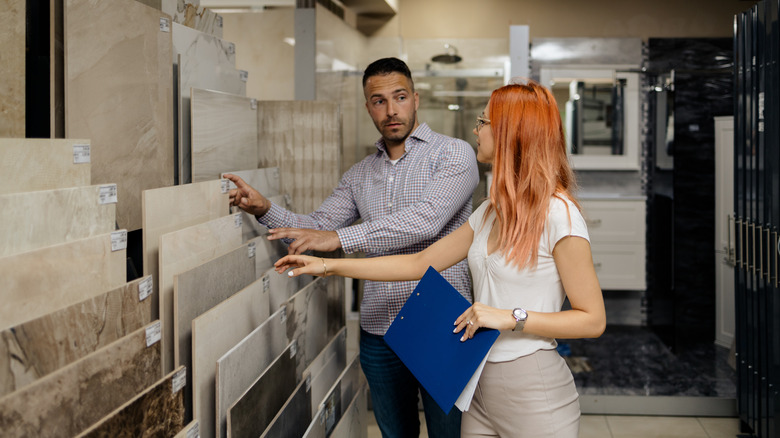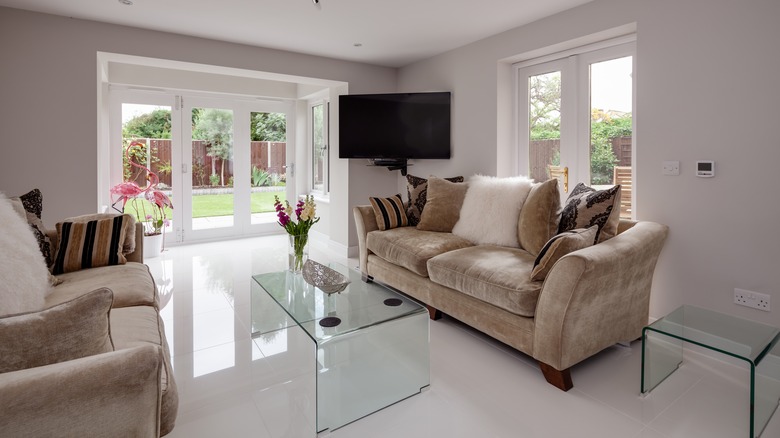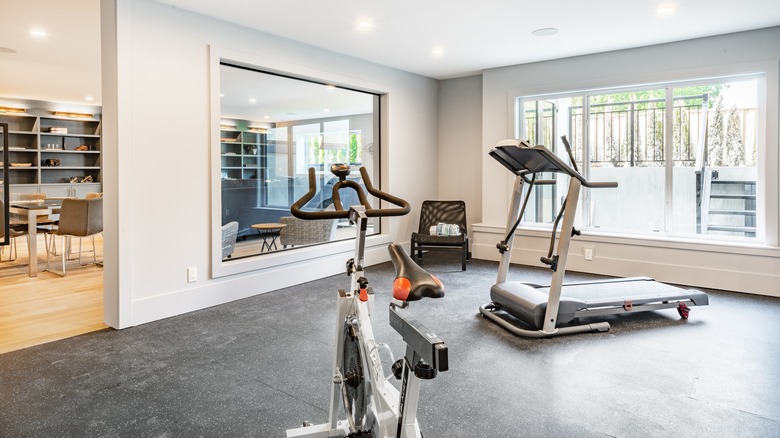These Flooring Choices Are Your Best Bet If You Live In A Humid Climate
If you don't wither and collapse in hot temperatures and high humidity, then you can tolerate a tropical or subtropical climate. The question is how to ensure your home can tolerate it too. In case you're on the cusp of building a home in a warm, damp climate, you'll need to choose your floors carefully. Flooring installation and materials can be quite costly, so you do want to get it right from the beginning. In addition to considering materials like waterproof laminate, your best flooring options to defend against moist climates are porcelain tiles, concrete, luxury vinyl tile, and, believe it or not, rubber.
Humidity can seriously damage your home. It creates the ideal conditions for mold and mildew to grow, including in places where it's hard to remove, like carpeting. And aside from carpeting, a wood floor is not ideal either. Because wood retains moisture, hardwood flooring is probably the worst flooring choice in these environments because it can buckle, crack, or split from the humidity. But if wood is a look that's important to you, some flooring alternatives are made to resemble wood. Regardless, all of these choices fare extremely well under damp conditions.
Best flooring choices for humid climates
One of the best floors to combat both humidity and heat is porcelain tile. Porcelain is made with extremely high heat, which makes it super durable. But porcelain does not absorb water, eliminating a dampness problem — these tiles are impervious to the climate. They also feel cool to the touch, so if you're running inside to escape a scorcher, you can cool down quickly in your bare feet. All prices will change based on where you live, and this is just an average, but expect porcelain tiles and installation to cost from $10 to $20 a square foot. For a 2,000-square-foot home, that cost could range from $20,000 to $40,000.
Concrete has come a long way from only being a staple of construction sites. It's become a chic kitchen countertop and a reliable, durable form of flooring that is also on the cooler side. The key to getting the most out of concrete is to make sure it's properly sealed. That seal prevents moisture and, therefore, germs and bacteria from proliferating. The average cost of basic, polished, and unstained concrete is $2 to $6 per square foot, ranging from $4,000 to $12,000 for our hypothetical 2,000-square-foot home. However, there are likely additional costs to handle installation obstacles like cabinets, the amount of polishing required, the condition of the floors, and necessary surface prep.
Additional flooring types
Luxury vinyl tile has also changed the game. You can buy it in a style that resembles wood planks or it can look just like real stone. It's waterproof, making it a decent anti-humidity contender. Because it's a thick material made from many layers, it's quite durable for high-traffic areas. A note of caution here — while luxury vinyl tiles are a good antidote to humidity, they may emit VOCs (volatile organic compounds), cannot be repaired, and are hard to remove or recycle. The cost of luxury vinyl tiles plus installation averages from $3 to $13 per square foot, or $6,000 to $26,000 for a 2,000-square-foot space.
You may not have considered rubber flooring, which is famous for covering the gyms of America, but it's a legitimately good option for tropical environments. Although not waterproof, it is water resistant, soft to walk on, and incredibly durable. Correctly sealing rubber is important for its longevity. It resists scuffing, can last for a couple of decades, and just think, you could break out into cardio anywhere in the house. Prices vary wildly depending on the rubber type, but the average range is $3 to $16 for materials, then add $1 to $4 per square foot for installation. So the range for our 2,000-square-foot house is from $8,000 to $40,000.


